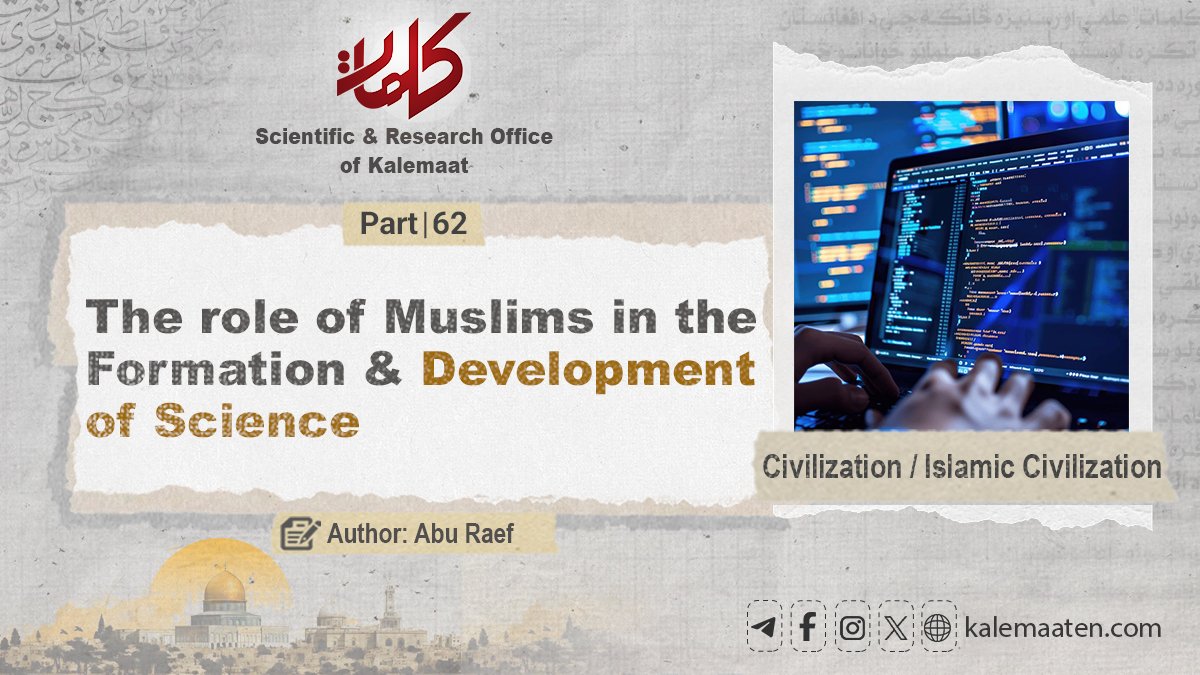Author: Abu Raef
The Role of Muslims in the Formation and Development of Science (Part 62)
Human External Beauty
One of the important issues that Islamic Sharia has addressed is the beauty of the human body and appearance. Allah Almighty asks us to be diligent and make efforts towards our external beauty and to show ourselves seriously in this path.
Allah created man with beauty and grace and depicted him in the best and most honorable form. As He said: «لَقَدْ خَلَقْنَا الْإِنسَانَ فِي أَحْسَنِ تَقْوِيمٍ» Translation: “We have indeed created human in the best of proportions”. [1]
And He also said: «الَّذِي خَلَقَكَ فَسَوَّاكَ فَعَدَلَكَ فِي أَيِّ صُورَةٍ مَّا شَاء رَكَّبَكَ» Translation: “It is He who created you, then made you perfect and moderate, and He has shaped you in whatever form He wills”. [2]
And Allah, describing the adornment and beauty He has placed for human on the earth, says: «إِنَّا جَعَلْنَا مَا عَلَى الْأَرْضِ زِينَةً لَّهَا لِنَبْلُوَهُمْ أَيُّهُمْ أَحْسَنُ عَمَلاً» Translation: “Indeed, we have made what is on the earth an adornment for it, that We may test them as to which of them is best in righteousness.” [3]
The commandment to beautify and adorn oneself is given in the Holy Quran, and the positions that refrain from benefiting from what Allah has created in nature and bestowed upon His servants are condemned. As he says: «يَا بَنِي آدَمَ خُذُواْ زِينَتَكُمْ عِندَ كُلِّ مَسْجِدٍ وكُلُواْ وَاشْرَبُواْ وَلاَ تُسْرِفُواْ إِنَّهُ لاَ يُحِبُّ الْمُسْرِفِينَ قُلْ مَنْ حَرَّمَ زِينَةَ اللّهِ الَّتِيَ أَخْرَجَ لِعِبَادِهِ وَالْطَّيِّبَاتِ مِنَ الرِّزْقِ قُلْ هِي لِلَّذِينَ آمَنُواْ فِي الْحَيَاةِ الدُّنْيَا خَالِصَةً يَوْمَ الْقِيَامَةِ كَذَلِكَ نُفَصِّلُ الآيَاتِ لِقَوْمٍ يَعْلَمُونَ.» Translation: “O children of Adam! Take your adornment at every prayer (in the mosque) and eat and drink, but do not be extravagant, for Allah does not love the extravagant. Say: Who has forbidden the adornment which Allah has produced for His servants and the good things? Say: These [blessings] are for those who believe in the life of this world, and on the Day of Resurrection they will be theirs. Thus, do We explain the signs for a people who know.” [4]
When Islam advises human to be neat and beautiful, it does not only mean taking care of the appearance and health of the body, such as the cleanliness of clothes and body, but before that it also pays attention to the beauty of morals and behavior; something that was realized and perfected in the human civilization of Islam. Therefore, human beauty is of two types: external beauty and spiritual beauty.
Physical beauty
It is no secret to anyone that cleanliness and purity and their care are among the most obvious manifestations of human civilization and, at the same time, are considered to be among the best manifestations of sensory or external beauty.
In fact, Islam entered this field in a miraculous way; a way that ensures the health of the body, mind, society and even humanity. To the extent that the Quran says: «وَاللّهُ يُحِبُّ الْمُطَّهِّرِينَ» Translation: “Allah loves those who purify themselves.” [5]
And also: «وَيُحِبُّ الْمُتَطَهِّرِينَ» Translation”: “Allah loves those who purify themselves.” [6] That is, those who keep themselves away from pollution and filth.
Even the Prophet Muhammad (peace and blessings of Allah be upon him) said: « الطهور شطر الإیمان» Translation: “Purity is half of faith.”
And some scholars have said in their interpretation of this hadith: “Its reward is half of the reward of faith.”
It is worth noting that these instructions were issued at a time when impurity and pollution were prominent features of European life. In such a way that people only bathed once or twice a year, and some even believed that the pollution that stuck to the body and clothes was a kind of blessing and made the body strong. [7]
At such a time, Islam guided Muslims to purity and the obligation of bathing, and even stated its recommendation in many cases. Because without bathing, their bodies are not clean, and without performing wudu, which can be performed up to five times a day, their prayers are not valid.
Bathing is obligatory after intercourse and during menstruation, and it is recommended during Eids, ihram, and… There is a difference of opinion among scholars about bathing on Fridays as to whether it is obligatory or recommended, but the prevailing opinion is that it is recommended.
The Prophet (peace and blessings of Allah be upon him) said: «غسل یوم الجمعة علی کل محتلم و سواک و یمس الطیب ما قدر علیه» Translation: “Ghusl (bathing) on Friday is obligatory for every adult, and he should brush his teeth and use perfume as much as he can.” [8]
He even specified a limit for the interval between two Ghusl, saying: «حق علی کل مسلم أن یغتسل فی کل سبعة أیام یوما، یغسل فیه رأسه و جسده.» Translation: “It is obligatory on every Muslim to take a bath every seven days, washing his head and body.” [9]
Some jurists have reduced the types of obligatory and recommended Ghusl to seventeen types, in order to emphasize their importance.
Islam also recommends the cleanliness of various parts of the body, especially those parts that are more susceptible to contamination and disease.
Continues…
Previous Part/ Next Part
References:
1. Surah Tin: 4.
2. Surah Infitar: 7-8.
3. Surah Kahf: 7.
4. Surah Al-A’raf: 31-32.
5. Surah Al-Tawbah: 108.
6. Surah Al-Baqarah: 222.
7. The Arab sun shines on the west, p. 54.
8. Bukhari: 840.
9. Bukhari: 856.



